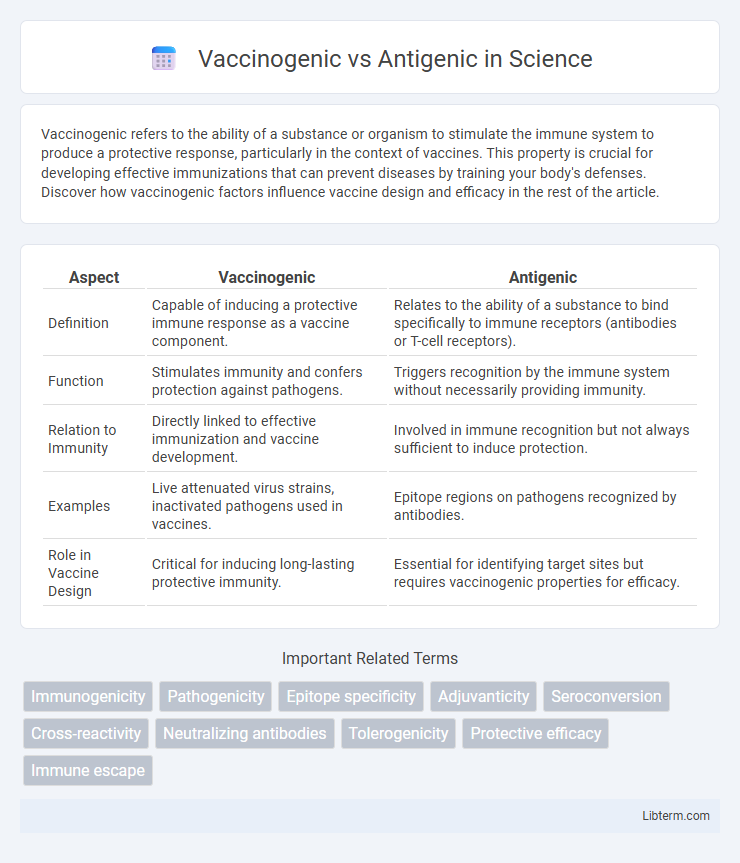Vaccinogenic refers to the ability of a substance or organism to stimulate the immune system to produce a protective response, particularly in the context of vaccines. This property is crucial for developing effective immunizations that can prevent diseases by training your body's defenses. Discover how vaccinogenic factors influence vaccine design and efficacy in the rest of the article.
Table of Comparison
| Aspect | Vaccinogenic | Antigenic |
|---|---|---|
| Definition | Capable of inducing a protective immune response as a vaccine component. | Relates to the ability of a substance to bind specifically to immune receptors (antibodies or T-cell receptors). |
| Function | Stimulates immunity and confers protection against pathogens. | Triggers recognition by the immune system without necessarily providing immunity. |
| Relation to Immunity | Directly linked to effective immunization and vaccine development. | Involved in immune recognition but not always sufficient to induce protection. |
| Examples | Live attenuated virus strains, inactivated pathogens used in vaccines. | Epitope regions on pathogens recognized by antibodies. |
| Role in Vaccine Design | Critical for inducing long-lasting protective immunity. | Essential for identifying target sites but requires vaccinogenic properties for efficacy. |
Introduction to Vaccinogenic and Antigenic Concepts
Vaccinogenic properties refer to the ability of a substance, typically an antigen, to induce an immune response that provides protective immunity when used in vaccines. Antigenic characteristics define a molecule's capacity to bind specifically to antibodies or immune receptors, triggering an immune recognition but not necessarily resulting in protective immunity. Understanding the distinction between vaccinogenic and purely antigenic components is crucial for effective vaccine design and immunological research.
Defining Vaccinogenic Properties
Vaccinogenic properties refer to the ability of a substance, typically a pathogen or its components, to induce a protective immune response when used as a vaccine. These properties include the capacity to stimulate robust immunogenicity and long-lasting immunity without causing disease. In contrast, antigenic properties describe the ability to bind specifically to immune receptors but do not necessarily imply the induction of protective immunity.
Understanding Antigenic Characteristics
Antigenic characteristics refer to the specific molecular structures on pathogens that trigger an immune response, enabling recognition by antibodies and immune cells. Vaccinogenic properties emphasize the ability of these antigens to stimulate long-lasting immunity when formulated into vaccines. Understanding the antigenic variability and stability is essential for designing effective vaccines that provide broad and durable protection against evolving infectious agents.
Key Differences Between Vaccinogenic and Antigenic
Vaccinogenic refers to the ability of a substance to induce immunity and stimulate the production of protective antibodies, whereas antigenic pertains to the capacity to bind specifically with immune receptors like antibodies or T-cell receptors. Vaccinogenic factors actively trigger an immune response that leads to long-term protection, while antigenic properties only indicate the recognition potential without guaranteeing immunity. Understanding this distinction is crucial for vaccine development, as a vaccinogenic component must be both antigenic and capable of inducing a robust immune memory.
The Role of Vaccinogenicity in Vaccine Development
Vaccinogenicity refers to a microbe's ability to provoke an immune response strong enough to provide long-lasting immunity, which is a critical criterion in vaccine development. Unlike antigenicity, which simply denotes the ability to bind with specific antibodies or T-cell receptors, vaccinogenicity ensures the immune system is effectively trained to recognize and combat the pathogen. Selecting pathogens or components with high vaccinogenicity maximizes vaccine efficacy, leading to robust and durable protection against infectious diseases.
Antigenicity: Immune System Recognition
Antigenicity refers to the ability of a substance to be specifically recognized by immune system components such as antibodies or T-cell receptors, triggering an immune response. Vaccinogenicity, however, denotes the capability of a substance to induce protective immunity when used in a vaccine formulation. Understanding antigenicity is crucial for designing vaccines that effectively stimulate immune recognition and memory against pathogens.
Vaccine Design: Balancing Vaccinogenicity and Antigenicity
In vaccine design, balancing vaccinogenicity and antigenicity is crucial to ensure both a strong immune response and effective recognition of the pathogen. Vaccinogenic components stimulate robust immune activation, while antigenic elements are essential for specific pathogen targeting by antibodies. Optimizing this balance enhances vaccine efficacy by maximizing protective immunity and minimizing potential adverse effects.
Factors Influencing Vaccinogenic and Antigenic Responses
Vaccinogenic and antigenic responses are influenced by factors such as the molecular structure of the antigen, its epitope density, and the host's immune system variability, including genetic predisposition and prior exposure to similar pathogens. Adjuvants and delivery methods significantly enhance vaccinogenicity by promoting stronger and longer-lasting immune responses, whereas antigenic responses are primarily shaped by the antigen's ability to bind specific antibodies. Environmental factors, such as concurrent infections and nutritional status, also impact both vaccinogenic and antigenic effectiveness by modulating immune system responsiveness.
Case Studies: Vaccinogenic vs Antigenic in Practice
Case studies comparing vaccinogenic and antigenic properties highlight the distinct immune responses elicited by vaccine candidates versus natural pathogens. For example, research on influenza strains showed that vaccinogenic formulations induce broader, longer-lasting immunity by targeting conserved antigenic sites, whereas antigenic variation in wild virus strains leads to evasion and reduced vaccine effectiveness. Clinical trials in malaria vaccination demonstrate vaccinogenic efficacy by stimulating protective immunity despite antigenic diversity in Plasmodium species, emphasizing the strategic design of antigens to enhance vaccine performance.
Future Perspectives in Vaccinogenic and Antigenic Research
Future perspectives in vaccinogenic and antigenic research emphasize the development of personalized vaccines leveraging advanced genomic and proteomic data to enhance immune response specificity. Innovations in computational modeling and artificial intelligence are expected to accelerate the identification of novel epitopes with high immunogenic potential, improving vaccine efficacy against emerging pathogens. Integration of nanotechnology and novel adjuvants is anticipated to optimize antigen delivery systems, boosting the stability and targeted activation of immune pathways.
Vaccinogenic Infographic

 libterm.com
libterm.com